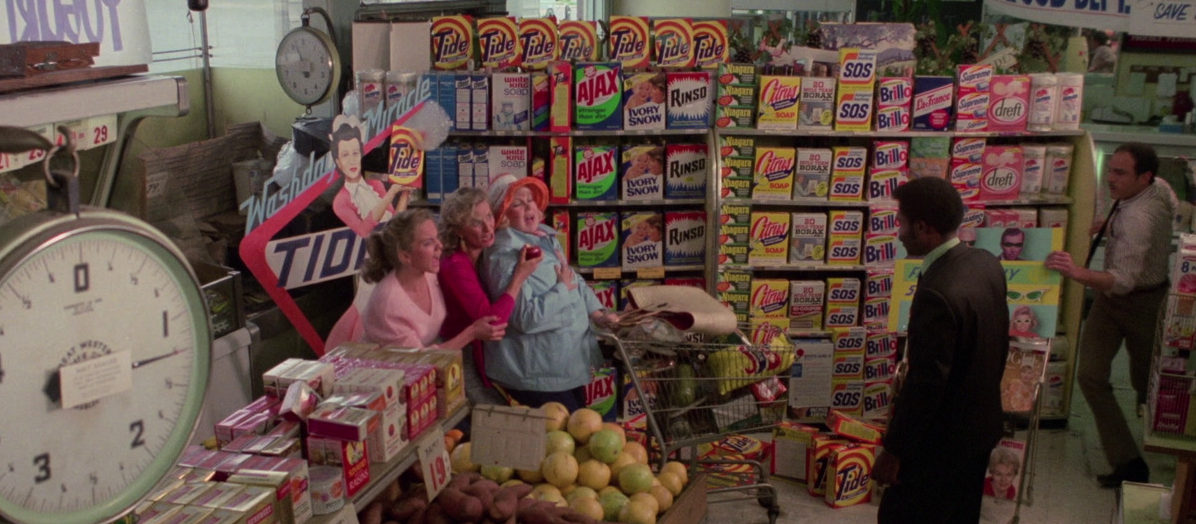

“What’s the good of being an outlaw if you look like an in-law?”
Like many iconic filmmakers of his era, Jonathan Demme cut his teeth working on low budget productions under the tutelage of Roger Corman—a man who, even if he hadn’t directed dozens of his own awesome genre films or helped numerous foreign directors gain a foothold in the American drive-in market, would remain a legendary figure for his eye as a talent scout alone.
Demme began his career with the Corman–produced Caged Heat, which, in retrospect, had a lot going for it besides its exciting young director. Namely, it was shot by frequent Demme collaborator Tak Fujimoto and scored by Velvet Underground alumnus John Cale and blues rock legend Mike Bloomfield. That’s a lot of talent for a trashy exploitation flick about an uprising in a women’s prison, but the production provided the perfect low-stakes venue for the director to hone his thoughtful approach to cinematic storytelling.
Demme’s second film, Crazy Mama, which is probably the better of his two low-budget efforts made for Corman’s New World Pictures, is much the same as his first in its approach, using music and humanistic touches to reach marginally beyond genre confines. Though his nascent style is still being worked out, there are meaningful grace notes liberally sprinkled amongst the titillation, sloppy comedy, motorcycle races, and shoot-outs. It’s incredible that the film is so easily identifiable as a Demme picture considering he was handed the reins ten days before filming began when Corman fired the original director.
A cross between the ‘50s nostalgia of American Graffiti and the stylized violence of Bonnie and Clyde, the film tracks the exploits of a desperado salon owner played by Cloris Leachman.1 After being evicted from her failing beauty shop, Mable Stokes (Leachman), her mother Sheba (Ann Sothern), and her pregnant daughter Cheryl (Linda Purl) set off on a multi-state crime spree, cartoonishly rampaging from California to Arkansas to reclaim the old family farm that had been taken from them in a violent prologue. That 1930s prelude, not to mention the film’s very title, brings to mind Corman’s Depression era films like Big Bad Mama and Bloody Mama. However, though it never completely pivots away from the sex and violence of those pictures, Crazy Mama is more of a rambunctious comedy than a bloody exploitation film.
As the three generations of Stokes ladies travel across the country, dreaming up various criminal enterprises (gas station stickups, bank robberies, fake kidnappings, a sham wedding, feigned heart attacks) to buy back the farm, their posse expands to include a number of eccentric characters, among them a vacationing sheriff (Stuart Whitman), a witty octogenarian (Merie Earle), Cheryl’s tagalong boyfriend (Donny Most) and a greaser who has the hots for her (Bryan Englund, Leachman’s real-life son). It remains bouncy throughout as it amiably wanders, but briefly turns dark when the gang tries to break through a police road-block and gunfire erupts. The change in tone doesn’t match the goofy nostalgia trip of the rest of the film, but the tragic undercurrent does provide Demme the scaffolding to reach for some resonant flourishes.
Though Demme doesn’t quite have the deft handle on comedy that would mark his later films, there’s an undeniable forward momentum that makes it eminently watchable. You can knock the low-budget feel of it, but it’s hard to ridicule the fun performances, the camaraderie amongst the cast, the charming stunt work, the mildly adventurous location shoots, the chintzy ’50s-but-kinda-’70s aesthetic, or the diversified and vaguely edgy rock ‘n’ roll oldies soundtrack (not sure how Corman afforded the license for songs like ‘Lollipop’ and ‘All I Have to Do Is Dream’ considering his usual frugality). For those who like trivia (especially of the “Roger Corman also gave that guy his start in the movies” variety), Crazy Mama features the screen debuts of Bill Paxton, Dennis Quaid, and Will Sampson, and a rare acting appearance from enigmatic filmmaker John Milius.
1. Many who worked under Corman would go on to win major awards. Leachman, however, had already won an Academy Award for her work on Peter Bogdanovich’s The Last Picture Show. However, she was primarily known for her supporting roles and Crazy Mama offered the opportunity for her to receive top billing. Bogdanovich, of course, also began his career working for Corman.